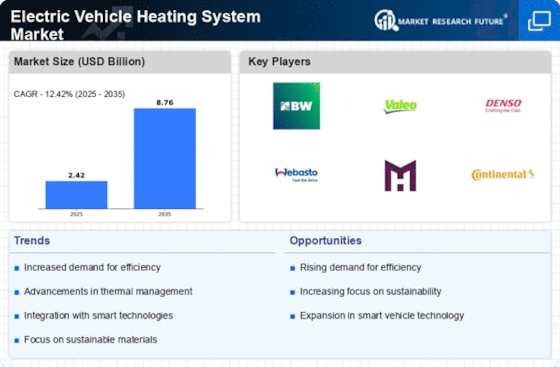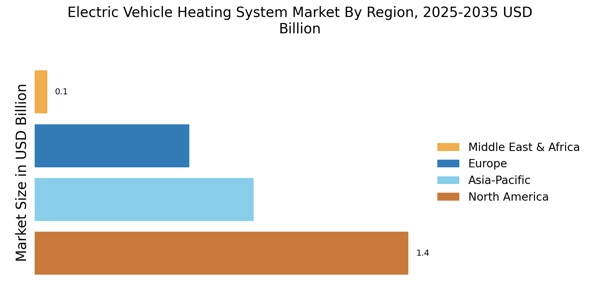Regulatory Frameworks
The Electric Vehicle Heating System Market is significantly influenced by evolving regulatory frameworks aimed at promoting sustainable transportation. Governments worldwide are implementing stringent emissions regulations and incentivizing the adoption of electric vehicles, which indirectly boosts the demand for efficient heating systems. For instance, regulations that mandate the reduction of greenhouse gas emissions are compelling manufacturers to invest in advanced heating technologies that comply with these standards. As a result, the market is likely to witness a robust growth trajectory, with projections indicating an increase in market size by approximately 15% over the next five years. This regulatory support is crucial for fostering innovation and ensuring the widespread adoption of electric vehicles.
Environmental Concerns
The Electric Vehicle Heating System Market is increasingly shaped by heightened environmental concerns among consumers and policymakers. As awareness of climate change and air quality issues grows, there is a strong push towards electric vehicles as a cleaner alternative to traditional combustion engines. Efficient heating systems play a pivotal role in reducing the overall energy consumption of electric vehicles, thereby contributing to lower emissions. This alignment with environmental goals is likely to drive market growth, with estimates indicating that the demand for electric vehicle heating systems could rise by 20% as more consumers seek eco-friendly transportation options. The emphasis on sustainability is thus a key driver in the evolution of this market.
Technological Innovations
The Electric Vehicle Heating System Market is experiencing a surge in technological innovations that enhance the efficiency and effectiveness of heating systems. Advanced materials and designs, such as heat pumps and ceramic heating elements, are being integrated into electric vehicles to optimize energy consumption. These innovations not only improve the thermal comfort of passengers but also extend the driving range of electric vehicles by minimizing energy loss. As manufacturers increasingly adopt these technologies, the market is projected to grow significantly, with estimates suggesting a compound annual growth rate of over 10% in the coming years. This trend indicates a strong alignment between technological advancements and consumer demand for more efficient heating solutions.
Consumer Demand for Comfort
The Electric Vehicle Heating System Market is driven by an increasing consumer demand for comfort and convenience in electric vehicles. As more consumers transition to electric vehicles, their expectations for interior climate control systems are rising. Effective heating systems are essential for ensuring passenger comfort, particularly in colder climates. Market data suggests that nearly 60% of electric vehicle owners prioritize heating efficiency when selecting a vehicle. This growing consumer preference is prompting manufacturers to enhance their heating systems, leading to innovations that not only improve comfort but also optimize energy use. Consequently, the market is expected to expand, with a projected growth rate of around 12% in the next few years.
Integration of Smart Technologies
The Electric Vehicle Heating System Market is witnessing a trend towards the integration of smart technologies that enhance user experience and system efficiency. Features such as remote heating control, adaptive climate control, and integration with mobile applications are becoming increasingly popular among consumers. These smart technologies not only provide convenience but also optimize energy usage, which is crucial for extending the range of electric vehicles. Market analysis indicates that the adoption of smart heating systems could lead to a 25% increase in consumer satisfaction, thereby driving demand. As manufacturers continue to innovate and incorporate these technologies, the market is poised for substantial growth, with projections suggesting a potential increase in market size by 18% over the next few years.

















